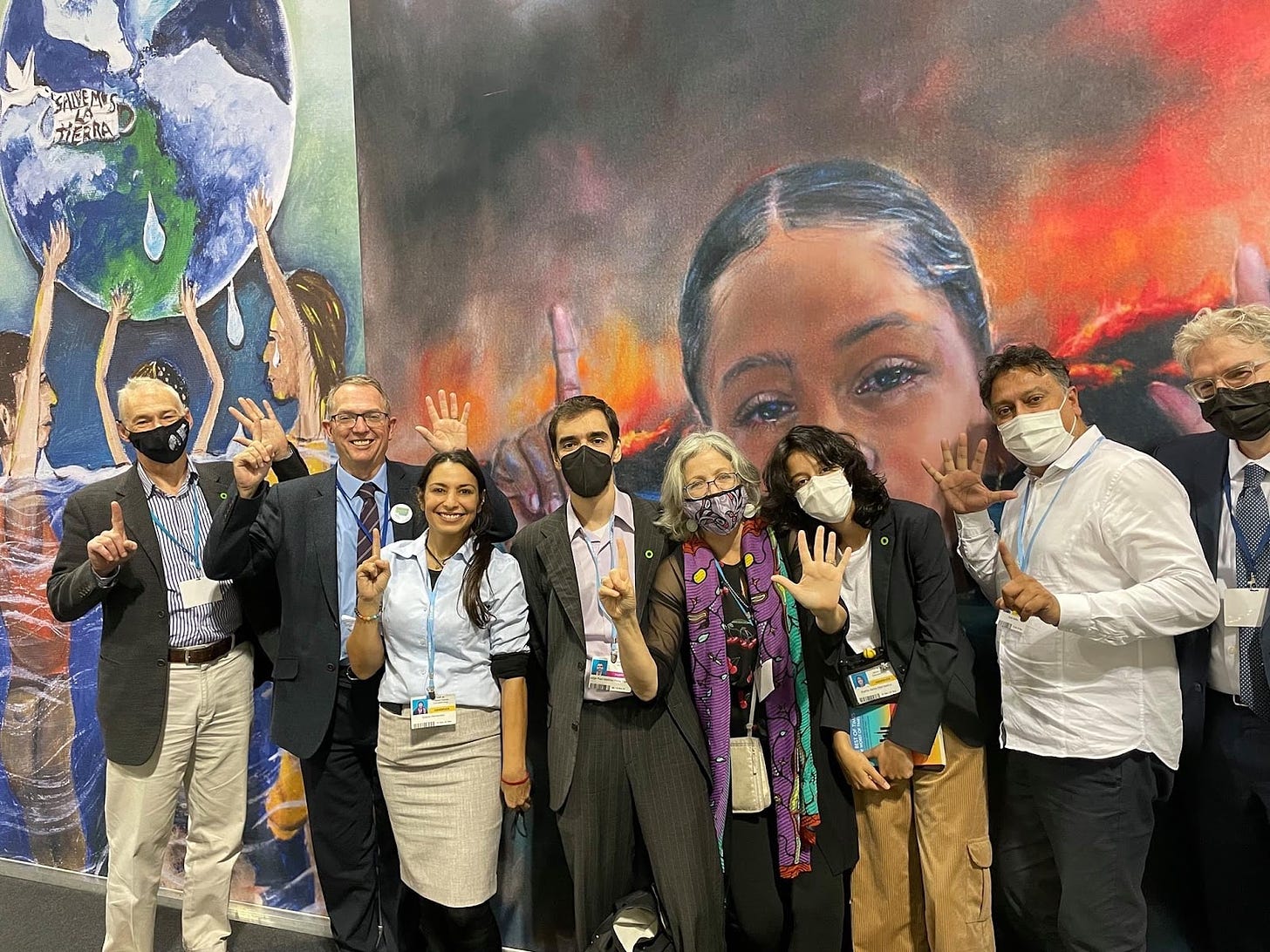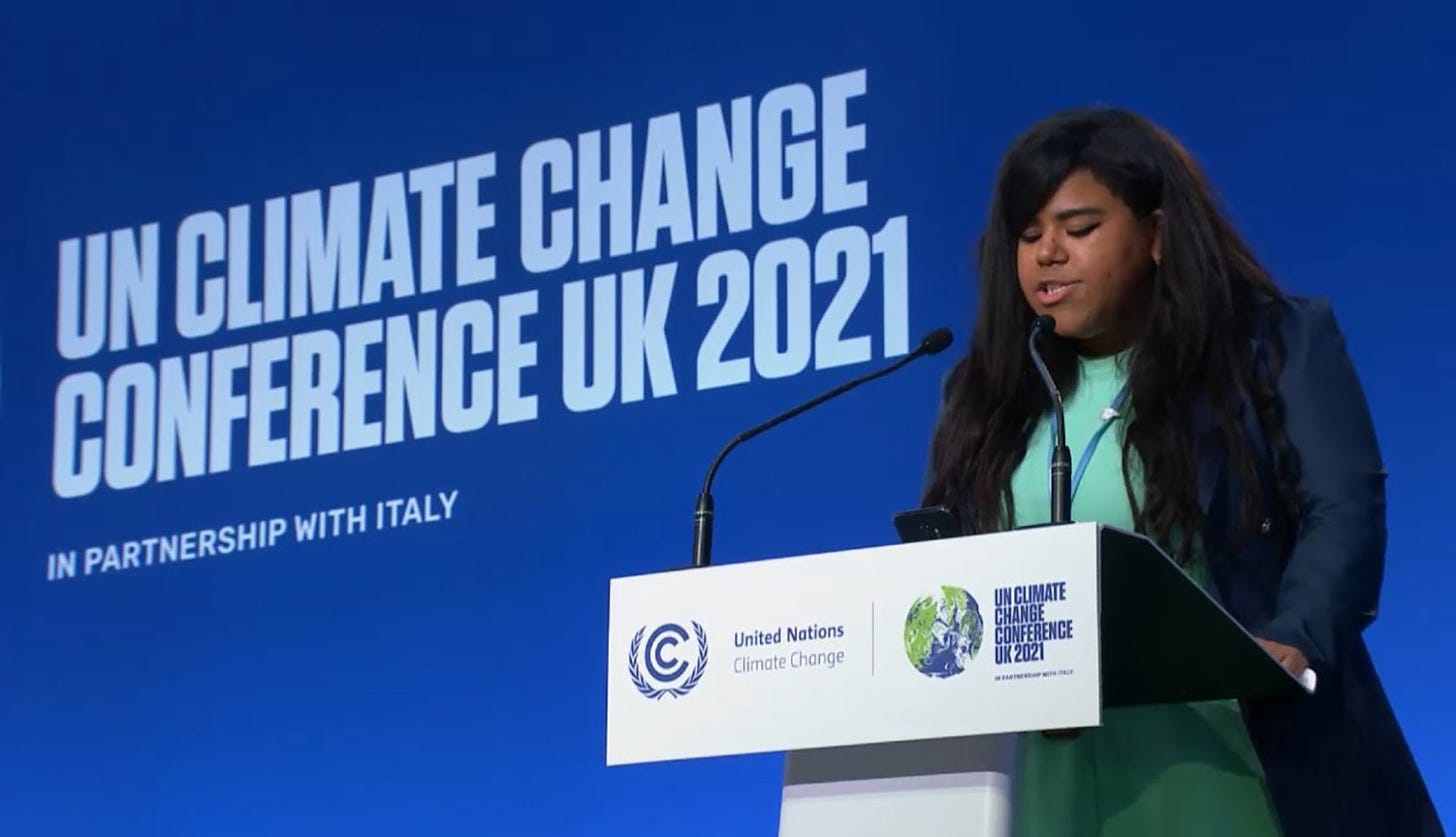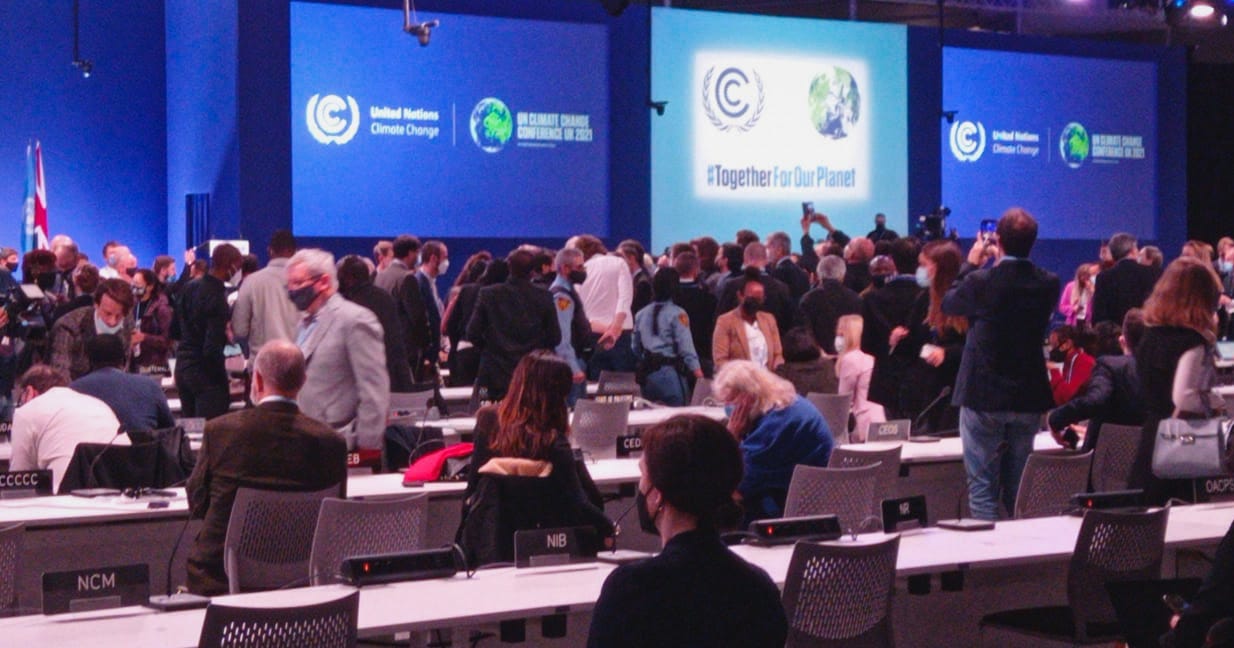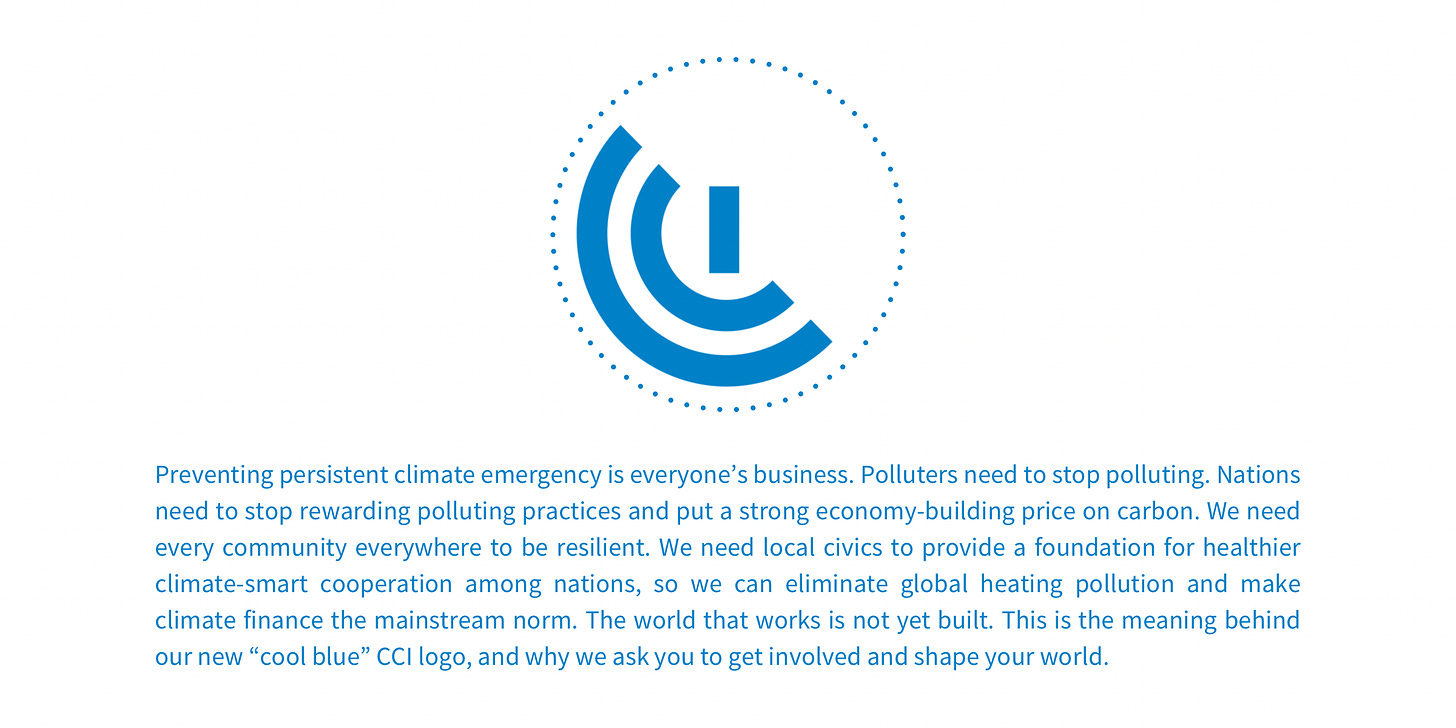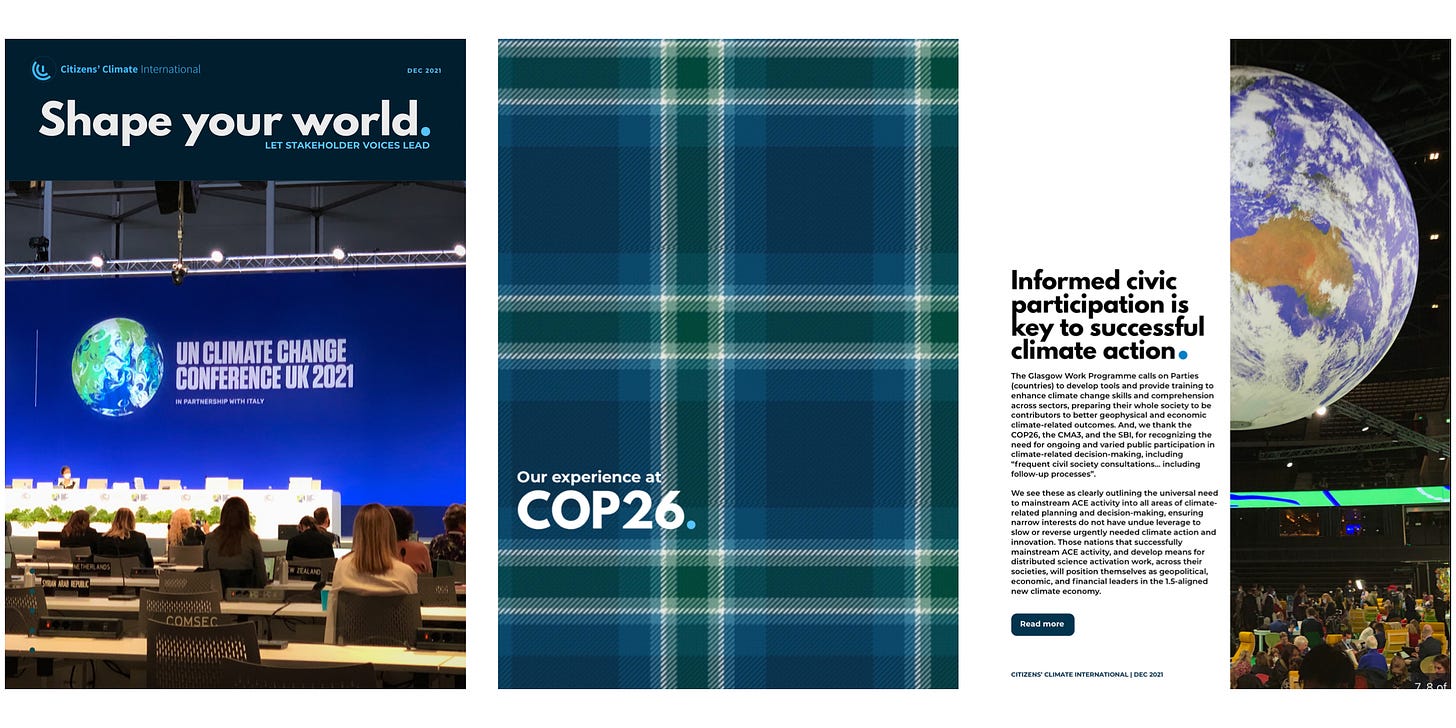COP26 Takeaways: Choose to avoid disaster; let stakeholder voices lead
NEWSLETTER, Dec 2021 — Our COP26 experience; the Glasgow Climate Pact; expanding the space for climate civics; inclusive climate finance; Paris Agreement Article 6.8…
The COP26 global climate negotiations in Glasgow were tasked with finalizing Paris rules, raising climate action ambition, nationally and globally, and vastly increasing pools of finance for climate transformation. Our delegation represented five continents, four generations, and dozens of areas of expertise. Our mission was to ensure stakeholders have a voice and to support international cooperation focused on best-case climate outcomes. Our key takeaway: We can choose to avoid disaster; making that choice means letting stakeholder voices lead.
Our experience at COP26
CCI managed the largest ever Citizens’ Climate delegation, including 23 of our own badge-holders (more than 30% of nation state delegations) and 10 more team members with other delegations. 6 of our team members were Party delegates, playing a role in their country’s formal engagement. Our 33 team members came from 15 countries and reached nearly every corner of the process.
13 remote support team members gave us an overall hybrid delegation of 46 people. We tracked 310 contacts and leaders, across 531 affiliations, and 237 events. We had more than 50 bilateral meetings, including meetings with 11 ministers or heads of state. Our team met with national and subnational lawmakers and engaged with the European Union—the world’s only true supranational government and the 197th Party.
Since 2014, we have been working to establish remote participation opportunities for citizens and stakeholders not able to join in person. Our Engage4Climate Toolkit helps people, communities, local governments, and organizations (“non-Party stakeholders”) host outcome-focused meetings of various kinds that can feed structured guidance to policy-makers, and enhance the ambition of intergovernmental negotiations.
This year, recognizing the urgent need for robust virtual participation opportunities, due to COVID-related travel and access restrictions, and related risk considerations, we created the People’s Pavilion. This virtual climate empowerment lab was a pilot for detailed future remote engagement of stakeholders in an Open COP process.
The People’s Pavilion covered 60 live sessions inside the COP26 venue and provided people an opportunity to participate remotely. 100 participants from 23 countries, on six continents, joined the Pavilion. In 2022, we will develop a detailed virtual pavilion process around the most successful elements of the People’s Pavilion, so more people and communities can engage meaningfully in the COP process.
Isatis Cintrón, a founding member of the CCI Board and Regional Coordinator for Latin America, addressed the COP26 plenary in the High-Level Segment, calling for respect for human rights and open civic processes in the design and governance of climate policies. Among the frustrations many experienced in Glasgow was the move by some nations to limit, or even eliminate, mention of human rights.
In the end, the Glasgow Pact states clearly on page 1:
“...acknowledging that climate change is a common concern of humankind, Parties should, when taking action to address climate change, respect, promote and consider their respective obligations on human rights, the right to health, the rights of indigenous peoples, local communities, migrants, children, persons with disabilities and people in vulnerable situations and the right to development, as well as gender equality, empowerment of women and intergenerational equity…”
Glasgow Pact invites historic race to enhanced climate action
Four major areas of ambition required immediate attention from world leaders, and from negotiators gathered in Glasgow:
Significant increase in ambition and acceleration of action to mitigate human-caused climate change.
Significant increase in overall commitment of finance to climate action and adaptation.
Significant increase in support from developed countries to developing countries for investment in adaptation to climate impacts, to build resilience and reduce risk.
Significant expansion of efforts to mainstream zero emissions priorities in finance, economic development, and trade.
The Glasgow Climate Pact achieves real progress in all four of these areas, though it required difficult compromise from most countries and constituencies, and there is much more to do. First, the compromise: At the last hour, two countries withheld consensus unless language regarding the global phase out of coal and fossil fuel subsidies was changed.
In the area of international cooperation to achieve overall mitigation of global emissions, agreed rules for Paris Agreement Article 6, paragraph 2 (cooperative approaches), paragraph 4 (establishing a mechanism), and paragraph 8 (non-market approaches), enhance the capability of countries to consolidate this kind of rapid emissions reduction and realignment of subsidies.
We urge all nations to work toward tightening of monitoring, verification, accounting, and accelerating decarbonization.
We call for alignment of non-market approaches with a strict commitment to steady and accelerating decarbonization.
We ask that Article 6 activities begin to prioritize direct investment in nature, and overall emissions reduction.
Citizens’ Climate International holds the view that all nations have a fundamental duty to their people, to:
Put a decisive and transformational price on pollution;
Foster inclusive clean development;
Mobilize finance to achieve at least 50% overall mitigation of global emissions by 2030;
Design and secure climate-smart sustainable food systems;
Invest in ways that restore ecosystems and biodiversity;
Defend and uphold human rights in all areas;
Welcome active participation by non-Party stakeholders in both the design and implementation of climate solutions.
Informed civic participation is key to successful climate action
The Glasgow Work Programme calls on Parties (countries) to develop tools and provide training to enhance climate change skills and comprehension across sectors, preparing their whole society to be contributors to better geophysical and economic climate-related outcomes. And, we thank the COP26, the CMA3, and the SBI, for recognizing the need for ongoing and varied public participation in climate-related decision-making, including “frequent civil society consultations… including follow-up processes”.
We see these as clearly outlining the universal need to mainstream ACE activity into all areas of climate-related planning and decision-making, ensuring narrow interests do not have undue leverage to slow or reverse urgently needed climate action and innovation. Those nations that successfully mainstream ACE activity, and develop means for distributed science activation work, across their societies, will position themselves as geopolitical, economic, and financial leaders in the 1.5-aligned new climate economy.
Financial integration & inclusion needed to get best results from Glasgow outcomes
During the opening days of the COP26 United Nations Climate Change negotiations, the Glasgow Financial Alliance for Net Zero (GFANZ) announced it had assembled 450 financial institutions controlling $130 trillion in wealth, committing to align their holdings with a global economy with net zero global heating emissions. The number is astonishing and unprecedented, and so the announcement has been celebrated as a major breakthrough, which it is.
There are critical questions about what the $130 trillion will do, and when. Will all of that money, for instance, line up with Science-Based Targets Initiative standards for net zero aligned with maximum heating of 1.5C? If so, that means halving global emissions by 2030. The biggest question of all, however, must be: Who can do what with that massive new allocation of capital?
To get climate solutions and nature-positive land use to scale, people who have been conventionally excluded from financial services, and who do not in themselves—as individuals, local projects, or community economies—provide significant expanded opportunity for the financial institutions, need to be included. Their wellbeing needs to be an investable priority for financial institutions, large and small, but they cannot afford to give up too much of their own income to financial services.
Article 6.8 rules could spur major climate policy acceleration
Rules for non-market approaches (NMA) to “overall mitigation of global emissions” (OMGE), under Paris Agreement Article 6, Paragraph 8, hold immense promise for accelerating climate-smart finance, agriculture, land use, infrastructure, and development. “Non-market” refers to ways for nations to work together to eliminate pollution, where there is no emissions trading system (or market) involved.
New rules for Article 6.8 activities are important, because non-market approaches:
Allow nations to cooperate to secure a faster pace of decarbonization;
Signal wisdom of policies like climate income, to set strong carbon prices, while fostering green recovery;
Make room for carbon border adjustments, to ensure climate leaders don’t lose trade to pollution offshoring
Increase likelihood of international “floor price” for carbon pollution
Recognize regulatory measures that mandate accounting, disclosure, and avoidance of carbon-related liabilities
Create conditions for climate-smart, nature-positive financial instruments
Link Special Drawing Rights (SDR) to Paris Agreement action and funding
Expand opportunity for mainstreaming of climate-smart finance
Invite integration of Earth science data platforms into financial decision-making information flows
Empower existing international institutions to become engines for climate action incentives and enforcement
Additional Resources
Read about CCI aims and activities around COP26:
COP26 resources:
For detailed news about each day of formal sessions at the COP26, visit the Earth Negotiations Bulletin by IISD.
For official COP26 negotiations documents, visit the UNFCCC Glasgow Conference documents section.
To track climate action from non-state actors, including investors, industry, and municipalities, follow the Race to Zero.
Download this newsletter as a PDF
Thanks to the brilliant design skills of Duane Saunders, you can now also read this newsletter in PDF form.



